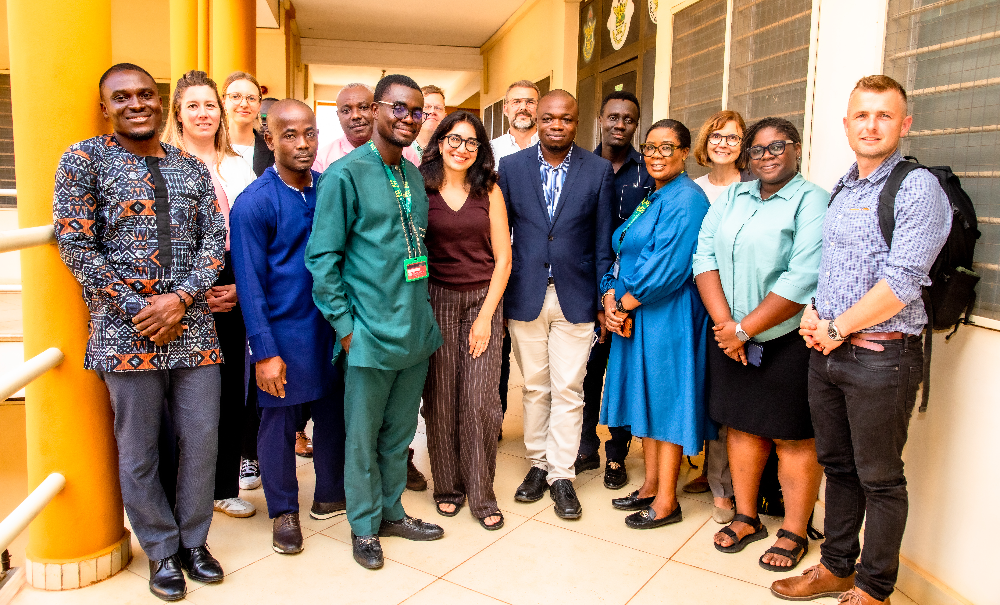Partners of the Upskilling Biomedical Engineers for Ghana project have visited the Kwame Nkrumah University of Science and Technology (KNUST), Kumasi to assess progress and discuss next steps regarding curriculum review, job market alignment, and industry-academia collaboration.
The project, which began in April 2023 and will run until March 2027, aims to enhance biomedical engineering education and healthcare delivery in Ghana.
The programme is led by Deutsche Gesellschaft für Internationale Zusammenarbeit (GIZ) GmbH in partnership with Partners in Transformation (develoPPP), Area9 Lyceum, B. Braun Group, Delft Imaging | Certified B Corp™, and Sysmex Corporation.
The initiative supports curriculum review, laboratory improvement, capacity building, and professional development.
The visiting team included Professor Torsten Wagner; Kerstin Heimal from Ventura B. Braun; Mario Geissler of Sysmex; Hans Simon Cray from Draeger GIZ; Petty Tangwahnye of B. Braun; Resal Saberi and Helene Widmer from GIZ Headquarters; Fred Effah Darko and Savior Dufie Boakye, both Technical Advisors at GIZ Ghana; and Joseph Du Santos of Sysmex.
They were welcomed by Biomedical Engineering lecturers Dr. Isaac Acquah, Dr. Prince Ebenezer Adjei, and Dr. Daniel Akwei Addo.
During the visit, the partners held a meeting with the Department of Computer Engineering and toured the laboratory currently being retooled under the project.
Head of Department, Professor Emmanuel Kofi Akowuah, noted that the university takes pride in its leadership in science and technology and views the project as an opportunity to develop local solutions.
“We are not only interested in training students to use equipment. We want to go beyond that, to develop new technologies. Could we build an industry where people design simple tools that save lives? That is our long-term goal,” he said.
He added that Ghana must strengthen innovation at the postgraduate level and create job opportunities through research and development.
“We are tackling three things at the same time: skills development, technology development, and healthcare improvement,” Professor Akowuah stated.
Paula Schwarz, Project Manager from GIZ Headquarters, described the visit as a “half-time check-in,” noting that the four-year project has reached its midpoint.
“We started in April 2023, and the project will end in March 2027. So this is a good time to meet and reflect on how far we’ve come. The goal is to improve market-oriented qualifications for biomedical engineering graduates and professionals in Ghana,” she said.
Ms. Schwarz highlighted that one of the key achievements so far has been the review of university curricula, with 16 lecturers and technicians involved in updating practical training modules.
“Two hundred and eighty (280) students will benefit from the revised curriculum, and the project will also offer short courses for professionals who want to refresh their knowledge,” she added.
She also mentioned that although Area9 Lyceum was not present during the visit, it is providing an online learning platform that will enable students to receive part of their training digitally.
Professor Torsten Wagner led discussions on curriculum reform and the gap between academic training and job market demands.
“There’s limited visibility of opportunities. Students need to prepare themselves for jobs that might not even exist yet. We discussed structured internships and the need to give students a strong professional identity that combines theory with practical work,” he said.
He observed that while there is a solid academic foundation, there is limited practical orientation.
“There’s a need to strike a balance. We need systems that support funding, teaching, and lab development. This is not free, it requires planning, risk-taking, and involving the right partners. The biggest risk is that the programme may not attract enough students. We must make it flexible and appealing,” he added.
Later, Professor Wagner joined KNUST Biomedical Engineering lecturers for a curriculum development workshop.
The visit also included a meeting with the Provost of the College of Engineering, represented by Professor Kwaku Amaning Adjei, Dean of the Faculty of Civil and Geo Engineering. The College Registrar, Ida Saeed, was also present.
A brief presentation on the project was followed by discussions on challenges, expectations, and preparations for the upcoming lab opening.
Professor Adjei reaffirmed the College's commitment to the project.
“The faculty supports the programme, and the Provost is pleased with the progress. The project includes training for lecturers and technicians. We are excited about the equipment and the opportunities it brings,” he said. “This is important for curriculum review. We are looking at how our graduates can avoid long queues for jobs and instead become creators of opportunities. If they can use the equipment effectively, they gain an advantage.”
The partners expressed their commitment to ensuring that the project creates long-term value by supporting both education and job creation.
“The companies also benefit. They need trained professionals in the field. This project helps create that talent pool,” Ms. Schwarz noted.
The project also includes outreach to senior high schools, with nearly 7,000 science students already introduced to biomedical engineering through STEM conferences.
Professor Akowuah urged the partners to ensure the project gains greater visibility.
“Partnerships thrive when people know what you are doing. Visibility is key,” he said.
The partners are expected to continue working with KNUST and the University of Ghana to improve teaching, learning, and innovation in Ghana’s biomedical engineering sector.

















